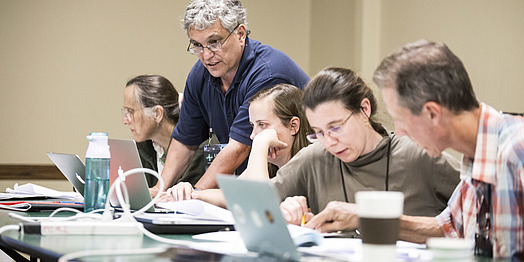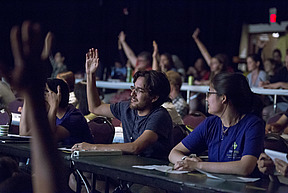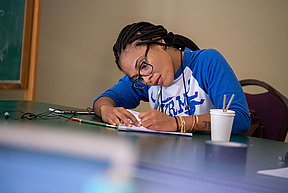
PCMI 2023 Undergraduate Faculty Program
The Undergraduate Faculty Program (UFP) at PCMI is aimed at faculty members from all types of colleges and universities with a strong interest in undergraduate teaching and research. Some participants are looking to rekindle their engagement with mathematical research and to interact with the broader mathematical community, while others are looking for new teaching approaches. The focus of the UFP varies from year to year, although its mathematical content is always aligned with the main research theme of PCMI that summer. In some years it is run as a small group seminar focused on some interesting parts of mathematics, in a setting which emphasizes participants working on ideas and problems together; in other years some part of it is also devoted to pedagogical issues or curriculum development. The UFP typically has around 15 participants, which allows for close and informal interactions among the participants.
UFP participants also interact with the participants and lecturers in the other programs, and in particular may choose to attend some of the Undergraduate and Graduate Summer School lecture series. Members from all parts of PCMI may take part in the Experimental Math Lab, in which small groups of participants with close mentorship from a more senior mathematician investigate open-ended problems and report on their findings at the end of the three-week Summer Session. Interaction among everyone at PCMI is fostered by various informal social activities open to all PCMI participants, as well as daily “cross-program activities’’ that include lectures and presentations on topics of general mathematical interest.
PCMI will be held July 16-August 5, 2023.
2023 Research Theme: Quantum Computation
The lecturers for the Undergraduate Faculty Program in 2023 will be Eric Rowell (Texas A&M University) and Shawn Cui (Purdue University).
The Mathematics of Topological Quantum Computation
Topological quantum computation is an appealing approach to building a large-scale fault-tolerant quantum computer. The quantum systems to perform topological quantum computing are topological phases of matter that support quasi-particle excitations called anyons. In this course we will learn the fundamental mathematical underpinnings of topological quantum computation; no physics background is required. The mathematical topics include braid group representations, knot and link invariants, tensor categories, and topological quantum field theory. These will be brought to bear on questions such as detecting non-abelian and universal anyons, constructing universal measurement-assisted protocols, and classifying and analyzing categorical models.

